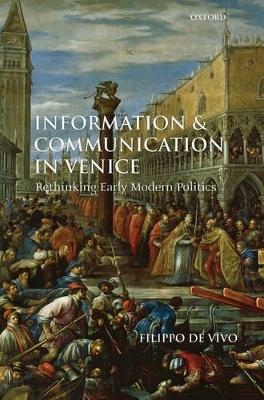
Information and Communication in Venice
Rethinking Early Modern Politics
Seiten
2007
Oxford University Press (Verlag)
978-0-19-922706-8 (ISBN)
Oxford University Press (Verlag)
978-0-19-922706-8 (ISBN)
Combining cultural, urban, and political history, this book assesses the extent to which communication and politics mutually influenced each other in sixteenth- and seventeenth-century Venice, using a wide range of sources including including rumours, graffiti, spies' reports, council debates, leaks, and printed pamphlets.
This is a unique investigation of the political uses of different forms of communication - oral, manuscript, and printed - in sixteenth and seventeenth century Venice. De Vivo uses a rich and diverse range of sources - from council debates to leaks and spies' reports, from printed pamphlets to graffiti and rumours - to demonstrate just how closely political communication was intertwined with the wider social and economic life of the city.
The book also engages with important wider problems, inviting comparison beyond Venice. For instance, today we take it for granted that communication and politics influence each other through spin-doctoring and media power. What, however, was the use of communication in an age when rulers recognized no political role for their subjects? And what access to political information did those excluded from government have?
In answering these questions, de Vivo offers a highly original reinterpretation of early modern politics that steers a course between the tendency of the political historian to view events from the windows of government buildings and the 'history from below' of social historians. As this account shows, neither perspective is sufficient in isolation, because even the most secretive oligarchs, ensconced in the Ducal Palace's most restricted councils, were constantly preoccupied by their vociferous subjects in the squares below. Challenging the social and cultural boundaries of more traditional accounts, the book goes on to show how politics in early modern Venice extended far beyond the patrician elite to involve the entire population, from humble clerks and foreign spies, to notaries, artisans, barbers, and prostitutes.
This is a unique investigation of the political uses of different forms of communication - oral, manuscript, and printed - in sixteenth and seventeenth century Venice. De Vivo uses a rich and diverse range of sources - from council debates to leaks and spies' reports, from printed pamphlets to graffiti and rumours - to demonstrate just how closely political communication was intertwined with the wider social and economic life of the city.
The book also engages with important wider problems, inviting comparison beyond Venice. For instance, today we take it for granted that communication and politics influence each other through spin-doctoring and media power. What, however, was the use of communication in an age when rulers recognized no political role for their subjects? And what access to political information did those excluded from government have?
In answering these questions, de Vivo offers a highly original reinterpretation of early modern politics that steers a course between the tendency of the political historian to view events from the windows of government buildings and the 'history from below' of social historians. As this account shows, neither perspective is sufficient in isolation, because even the most secretive oligarchs, ensconced in the Ducal Palace's most restricted councils, were constantly preoccupied by their vociferous subjects in the squares below. Challenging the social and cultural boundaries of more traditional accounts, the book goes on to show how politics in early modern Venice extended far beyond the patrician elite to involve the entire population, from humble clerks and foreign spies, to notaries, artisans, barbers, and prostitutes.
Filippo de Vivo is the author of numerous scholarly articles on the history and historiography of the Republic of Venice. He was educated at the University of Cambridge and at the Ecole des Hautes Etudes en Sciences Sociales in Paris. He was a Research Fellow of Trinity College, Cambridge, and since 2003 has been a Lecturer in the School of History, Classics, and Archaeology at Birkbeck College, London.
Introduction ; 1. Communication in the government ; 2. Communication in the political arena ; 3. Communication in the city ; 4. Communicative transactions ; 5. The system challenged: The Interdict of 1606-7 ; 6. Propaganda? Print in context ; Epilogue ; Bibliographical references ; Index
| Erscheint lt. Verlag | 11.10.2007 |
|---|---|
| Zusatzinfo | 6 tables, 1 map |
| Verlagsort | Oxford |
| Sprache | englisch |
| Maße | 163 x 239 mm |
| Gewicht | 655 g |
| Themenwelt | Geschichte ► Allgemeine Geschichte ► Neuzeit (bis 1918) |
| Geisteswissenschaften ► Geschichte ► Regional- / Ländergeschichte | |
| Sozialwissenschaften ► Kommunikation / Medien ► Kommunikationswissenschaft | |
| ISBN-10 | 0-19-922706-3 / 0199227063 |
| ISBN-13 | 978-0-19-922706-8 / 9780199227068 |
| Zustand | Neuware |
| Haben Sie eine Frage zum Produkt? |
Mehr entdecken
aus dem Bereich
aus dem Bereich
Europa 1848/49 und der Kampf für eine neue Welt
Buch | Hardcover (2023)
DVA (Verlag)
48,00 €
Giordano Bruno - ein ketzerisches Leben
Buch | Hardcover (2024)
C.H.Beck (Verlag)
29,90 €
die Fahrt der Bounty und die globale Wirtschaft im 18. Jahrhundert
Buch | Hardcover (2024)
Klett-Cotta (Verlag)
25,00 €


